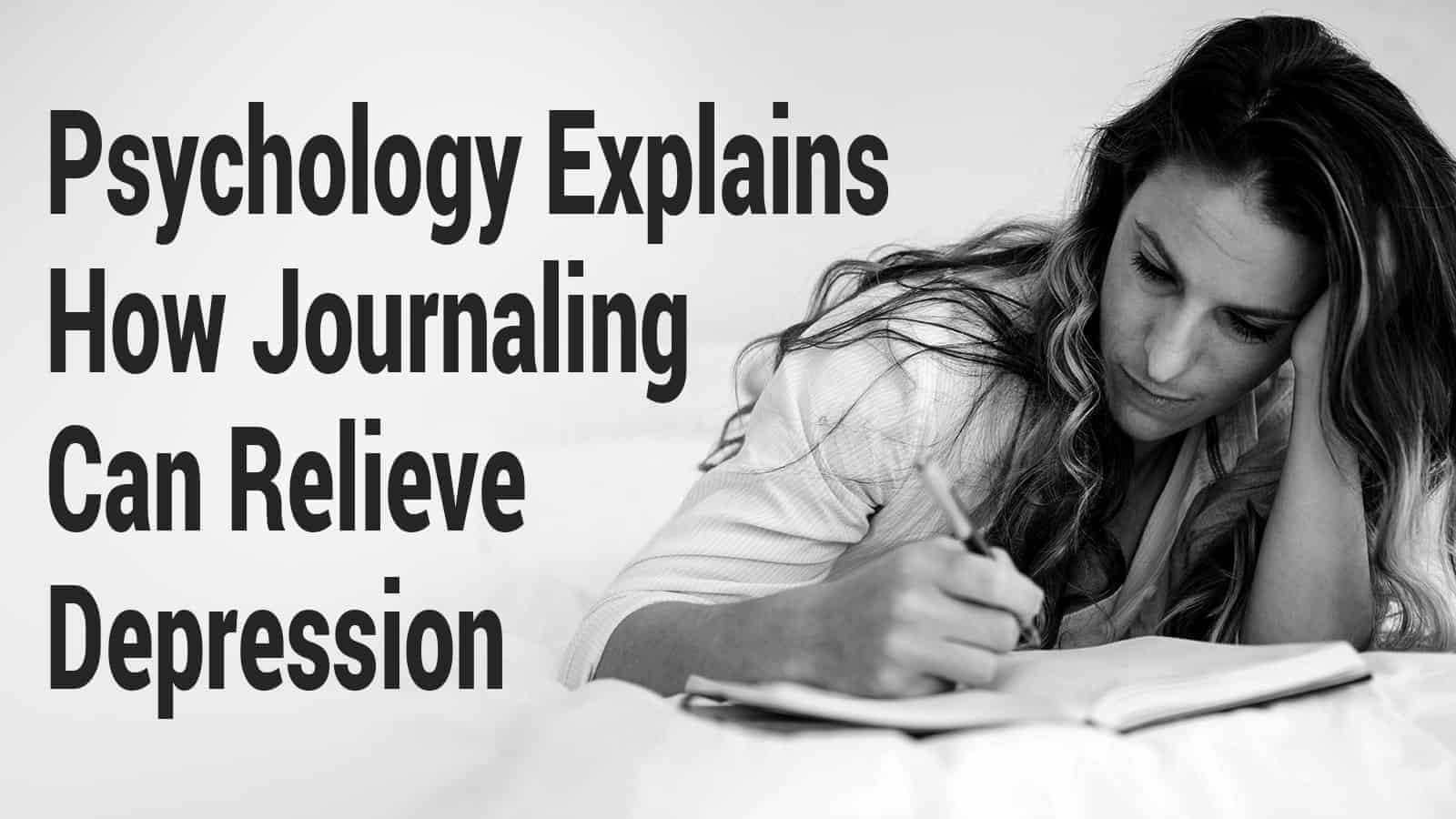Depression and writing, or any form of art, seem to go hand in hand. When we think of some of the “Greats” in literature, painting, acting, and music, a tendency toward depression or bipolar disorder appears to be one of the qualifying factors to their greatness.
Is it possible that it’s a coincidence? Perhaps a representation of particular personality traits shared with many of those with a mental illness? Whichever it may be, writing has been shown to help those with depression. Psychology explains how journaling can relieve depression.
Is there a connection between creativity and mental illness?
Psychologists have been attempting to determine if there is a connection between creativity and mental illness for many years. Are we just drawn to the drama of romanticizing an artist’s pain and struggle similarly to our morbid attraction to the concept of vampires, or are these agonized souls truly blessed and cursed with creativity due to mental illness?
In 2017, a study by Christa L. Taylor of Albany State University was published in Perspectives on Psychological Science, attempting to get to the root of this question. Are creatives more prone to mental illness vs does mental illness make one more creative?
Christa analyzed over 36 studies. First, she focused on if creative people were more prone to a mood disorder. She compared various creative types in 10 different studies and discovered that more creatives than non-creatives tended to be bipolar.
The study results
Interestingly enough, those with chronic but functional depression were found to be equally creative and not creative.
The next question was, are those with a mood disorder more likely to be creative? Her conclusion was two-part. Firstly, that no, having a mood disorder did not make you creative in general. The second part was that yes, bipolar or severely depressed individuals tended to be more artistically creative or likely to excel in painting or an expressive art form in comparison to just able to creatively troubleshoot or find differing options from the norm.
That said, the numbers in comparison to the creatives without a mood disorder were very tight and, therefore, left room for interpretation.
Overall, her analysis showed that yes, creative people tend to be more prone toward mood disorders, but mood disorders did not guarantee you would be creative.
Fortunately, journaling does not necessarily require creativity nor a mood disorder, even if it can be effective in helping both.
What is journaling, and how can we use it?
Journaling is the organized writing for the purpose of your choosing, with somewhat regularity and using a medium of your choice. It is similar to a diary, except it isn’t necessary to do it every day, and you aren’t limited to writing about events in your life, as is typical of a diary. Also, a journal can be supplemented with drawings, magazine images, or photos similar to a scrapbook. Some apps can even allow you to add vocalization recordings if you prefer.
Many people use a journal to:
- Express their emotions
- Track momentous occasions such as a pregnancy term, the birth of a baby, after a significant health diagnosis, moving to a new area or starting high school.
- Maintain a daily log of life events
- Express gratitude or affirmations
- Project ideas including for creative writing
- Clear their head when overwhelmed with thoughts or ideas
- Track diet and exercise
- Goal setting and tracking
A journal can be used any way you want it. With current technology, you could do it on your desktop or laptop computer, use an app on your phone or tablet, or you can keep it simple and use a notebook or particular book designed for journaling. It is all up to your preference. There really aren’t any rules about journaling other than, ideally, you want to be consistent in using it for what you designated it for. That designation may change over time but the point is that you choose to write for a purpose with some regularity, even if it is only once a month.
Effects of depression on your brain
Depression is a mood disorder that not only affects your emotions, but it also affects your brain and its functions.
Various regions of the brain begin to shrink within 8-12 months of being depressed. The areas affected are:
Hippocampus
Hippocampus is responsible for learning and memory. Especially involved in turning short term memories into long term memory.
Thalamus
Thalamus is a general operator of the brain. It receives outside information from all the senses, except for the sense of smell. It then relays that to the rest of the brain.
Amygdala
The amygdala helps to regulate emotions correlated to survival, especially fear. It also plays a role in your memory and your sexual desire and response.
Prefrontal cortex
The prefrontal cortex, which sits in front of the frontal lobe, is responsible for the ability to be organized, plan, reason, and our ability to adapt to changing situations.
Frontal lobes
Frontal lobes are responsible for your movements, ability to problem solve, memory, language ability, impulsivity, being spontaneous, your ability to use social skills, and your sexual behavior.
Inflammation of the brain
Brain inflammation also proves in studies to play a factor in depression. Brain inflammation results in less plasticity due to the shrinking of brain cells and neurons not effectively firing. This leads to a decrease in brain function.
Decreased oxygen to the brain.
Studies prove that depressed individuals tend to have less oxygen in their brains. This is believed to occur because depressed individuals tend to have depressed respiration, or they take slow, shallow breaths. Less oxygen results in furthering the inflammation and a decrease in functioning.
 How does journaling help to relieve depression?
How does journaling help to relieve depression?
Being depressed creates damage to various brain functions, which adds to the challenges of managing daily life as well as the additional symptoms of depression. The longer you are depressed, the harder it becomes.
Journaling is a great method to counter not only the mental functioning but also with the emotional turmoil, which is a part of depression.
What are the emotional and therapeutic benefits of journaling?
- For some people, just being able to express their emotions or thoughts can help decrease the weight of them. Many individuals with depression don’t feel they have anyone to talk to. They hold in what they are feeling. This adds to the feeling of them being overwhelming. Writing about your emotions allows you to take control and make sense of the whirlwind in your head.
- Getting emotions out can offer perspective. Putting your emotions down and then going back, can allow you to take a step back and review why you are feeling this way. You can see steps to handle the triggers better, or possibly identify where you may have misconstrued something. Showing these excerpts to your therapist can also assist them in showing you additional coping mechanisms and differing perspectives that perhaps you couldn’t see at the time.
- Journaling, especially if using it for gratitude or affirmations, can reflect back to your positivity. The act of writing out gratitude and affirmations before going to bed results in better sleep. When written in the morning, people tended to feel more positive throughout the day.
- Great way to track your emotions. There can be patterns of why a person feels depressed. A week of cloudy days, higher or decreased hormones during the month, or having to split time with parents. There can be a variety of things actually triggering the depression. Keeping a log of what is going on in our lives and how we feel can allow us to see the pattern.
How does journaling help the brain function improve while depressed?
As stated above, several brain functions decrease in their ability the longer an individual is depressed. Memory, problem-solving, organization, focus, and learning, to name a few. The act of journaling can help offset that decline or at least provide a tool to decrease its impact on your life. It is important to note that they are far more successful when you journal using handwriting as opposed to typing or a screen.
1 – The physical act of writing
The physical act of writing reinforces memory because it uses both motor skills and active memory. As we decline, we lose a small amount of memory and organizational skills. Thus, handwriting out your schedule, affirmations, gratitude, or goals reinforces them to your memory through muscle memory as well as active memory.
2 – Your attention to your task
Handwriting forces you to slow down and really pay attention to what you are writing. This forces you to recognize what you are writing. You will focus and organize thoughts and spend valuale time on reflection and retention.
3 – Journaling as meditation
Writing is also meditative, which can relieve stress. Stress is one of the biggest killers of focus, organization, and memory. The more stressed you are, the less you are analyzing, and the more you are reacting. Each person tends to write at a set pace. This pace creates a rhythm for your body and mind to follow, much like practicing breathing for meditation. Interestingly enough, if you listen to someone read out loud, as the listener, you will mimic their pace as well.
Final Thoughts on Journaling for Relieving Depression
Journaling is an excellent, flexible way to stay organized, record memories, track accomplishments and goals, and relieve depression. It allows you to express yourself emotionally, to keep your mind sharp and to stay one step ahead of depressive symptoms.
Managing depression is possible. Being happy is possible. Beating the challenges of your every day is possible. Journaling is the perfect way to remind yourself of how you are a survivor beyond the symptoms of depression.














 Community
Community

